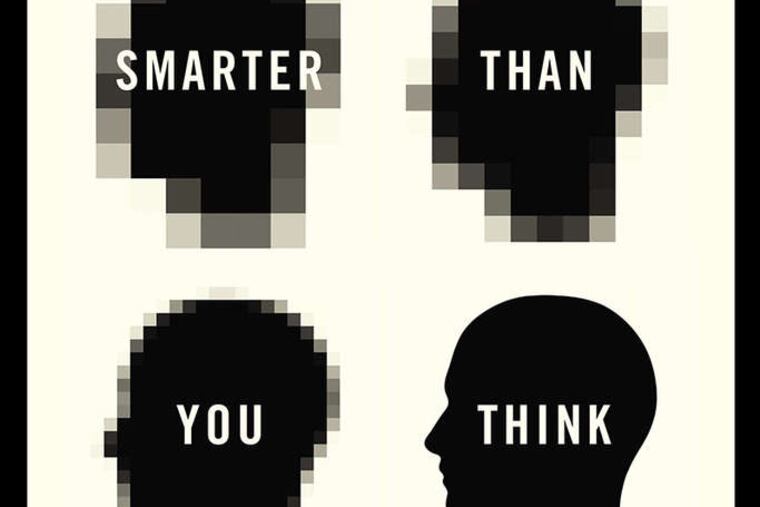Book Review: Clive Thompson's 'Smarter Than YouThink'
This cleverly titled book is essential reading for anyone who has ever touched a computer. Far from being an über-geek, Thompson teases out the ramifications of extended computer use on, well, everybody. He recognizes the potentially corrosive effects of the new technology, but his conclusions are not what the typical non-geek might expect.

Smarter Than You Think
How Technology is Changing Our Minds for the Better
By Clive Thompson
Penguin Press HC. 352 pp. $27.95
nolead ends nolead begins
This cleverly titled book is essential reading for anyone who has ever touched a computer. Far from being an über-geek, Thompson teases out the ramifications of extended computer use on, well, everybody. He recognizes the potentially corrosive effects of the new technology, but his conclusions are not what the typical non-geek might expect.
It turns out every form of mass communication throughout history has provoked hand-wringing. Dire predictions of intelligence drain and boorish manners followed the invention of movable type, the printing press, the telephone (with its "vulgar" Hello?, derived from a hunting call), mass-market publishing, the coffeehouse, and even writing itself. Socrates "worried that [writing] would destroy our factual knowledge" by storing it elsewhere than in the human brain. Did someone say, "Google"?
Thompson places responsibility for the latent power of connectivity and instant information access in the hands of users. "Reaping the cognitive benefits of the Internet often requires social work," he writes:
We'll need to become more adroit at using ambient tools (the haze of apparently irrelevant personal information on social media sites) - and remain critical users. Our record thus far is mixed. People have a long track record of handing over power to the Facebooks of the world in exchange for convenience.
He believes, however, that the purported trivialization of human conversation may not be real; rather, it's "revealing how trivial we've been all along."
Banality is one thing. Can we blame the Internet for bad behavior? Open-comment blog forums can become vicious bear pits. When sites aim for large online participation, they "produce . . . drive-by audiences that can never be corralled into community standards." For discussion purposes, smaller is better. Ta-Nahesi Coates "posts daily on a dizzying array" of topics at the Atlantic Monthly website, not the least of which is race. " 'This is the most hot-button issue in America, and folks have managed to keep a fairly level head,' " Coates tells Thompson. "Before he started blogging, Coates had noticed the terrible comments at his favorite political blogs. He headed off the problem by being an active curator of his own comment thread, deleting abusive comments, banning repeat offenders, and encouraging "the smart folks."
There's a high-tech name for someone like Coates: He's a "tummeler," derived from the Yiddish tummler, the person at a wedding who keeps the crowd dancing. He mixes "persuasion, listening, and good hosting, like someone skillfully tending bar."
Thompson advocates for a "new literacy" in which schoolchildren are taught the savvy navigation of search engines, rather than relying on whatever Google spits out.
Ideally, technology breaks down elitist intellectual barriers, but only if you know how to access what's going on behind the screen. "Whereas the authority of traditional publishing relies on expertise - trust us because our authors are vetted . . . conversational media gains authority by revealing its mechanics." On the talk page of a Wikipedia article, "you'll see the passionate, erudite conversations between Wikipedians as they hash out an item."
What about "recency" the bias toward the latest information, no matter what it is, the feeling that info arriving right now is more important than past events? Yep, Thompson says, that's a problem. Yet some who follow behavior trends in technology think "our early infatuation with incessant online contact is already easing."
Perhaps the future lies in the person of Thad Starner of the Georgia Institute of Technology. He wears a computer on his chest like body armor. A tiny screen built into his glasses and a mini-keyboard allow him almost instant Net access. His connectivity, Thompson reports, "produces moments of seeming omniscience." Yet "Starner doesn't come off as a high-tech ADD head case" but rather is "very attentive and polite. . . . If he's talking to someone about the Boston Red Sox, he's not secretly perusing cute-cat videos." Starner's repeated reference to his external brain has, if anything, increased his memory. His computer's ease of use allows him to re-consult until information becomes ingrained.
At its best, technology offers power to those who would otherwise be powerless to do good. During the 2011 crackdown by the Egyptian military, a young Egyptian living in Dubai opened a Twitter account that reported "which tent hospitals needed supplies," creating, "in essence, an on-the-fly aid organization" in which none of the participants actually lived in Egypt. Critical medical supplies were located and donated, and hundreds of lives were saved. Technically, this organizer's organization "didn't even exist."
This is not an isolated story. Thompson's recounting of how citizen innovators in Kenya and China pulled off humanitarian triumphs via the new technologies is nothing less than thrilling. Their experiences are worth an army of retweets.